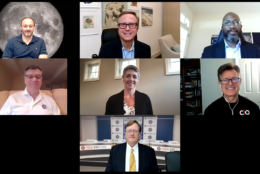SDFM The Business of Defense
-
In the recent past, barcodes have been the standard method for keeping track of products, but with the advent of 5G, automation and machine learning, warehouse management is finding new ways to move, store and keep track of items.
August 31, 2021 -
Join host Michael Keegan next week for Special Edition of The Business of Government Hour – COVID-19 and its Impact: a series on how the pandemic has transform government management and operations with guest Dr. Rob Handfield--discussing key steps in building national supply chain immunity.
August 30, 2021 -
This week hosts Mark Masselli and Margaret Flinter speak with Kentucky Governor Andy Beshear (D), on the dire situation in the Commonwealth as the delta-driven pandemic pushes the state’s hospitals to ‘disaster’ mode. He laments the recent State Supreme Court decision limiting his executive order powers, for initiating universal masking for all Kentucky children returning to day care and school, calling it ‘the right thing to do’ for vulnerable kids. He discusses efforts to battle the crisis with assistance from the National Guard and FEMA to address hospitals at the breaking point, with this much more contagious variant leading to highest death rates since the pandemic began, driven predominantly by unvaccinated people.
August 30, 2021 -
Hosted by Dr. Richard Shurtz. Sponsored by Stratford University. Show producer Andrew Mitchell shares his memories of long-time co-host Jim Russ, who passed away Aug. 18.
August 30, 2021 -
The recent cybersecurity executive order looks to improve threat information sharing between the private and public sectors.
August 26, 2021 -
President Joe Biden’s recent cybersecurity executive order sets several rapid-paced deadlines for agencies to work toward adopting a zero trust posture in order to generally harden the security of the federal government. But that doesn’t mean agencies have to accomplish this on their own.
August 26, 2021 -
Human capital experts from the Federal Emergency Management Agency, Nuclear Regulatory Commission, National Science Foundation and the Agriculture Department will explore how the workplace structure is evolving in government.
August 24, 2021 -
During this webinar, you will learn how federal IT practitioners from the Defense Logistics Agency, NASA Goddard Space Flight Center and the Transportation Security Administration are implementing strategies and initiatives around IT modernization.
August 23, 2021 -
The General Services Administration is reaping the benefits of data in motion in managing the expansive fleet of vehicles the agency either owns or leases, using the vast volumes of data it gathers to improve…
August 23, 2021 -
A Conversation on the Cybersecurity Risks of Smart City Technologies. What is “smart cities” technology? Do all smart city technologies pose equivalent cybersecurity risks? What are some of the most prevalent cyber threats posed by these technologies? Join host Michael Keegan has he explores these questions and more with Alison Post and Alex Pan co-authors, The Cybersecurity Risks of Smart City Technologies: What Do The Experts Think? Original Broadcast Date May 10, 2021
August 23, 2021 -
This content is sponsored by Microsoft Federal. President Joe Biden’s recent cybersecurity executive order jumpstarted agencies’ efforts to modernize the government’s IT infrastructure with a set of standards that will enable agencies to proactively address…
August 20, 2021 -
This exclusive e-book highlights the ways agencies are seeking to disrupt, dismantle and limit the damage of cyber attacks.
August 20, 2021 -
This content is provided by FEDS Protection. Many federal employees don’t realize the extent of their professional liability exposure until they find themselves at the center of a disciplinary proceeding, adverse administrative action or civil…
August 20, 2021 -
Agencies often have data stored in multiple silos and data lakes, making discovery difficult. In addition, that data is rarely in standardized formats, especially with regard to formats usable by AI and ML. But by applying DevOps principles to their data strategies, they can overcome this stumbling block much quicker, facilitating implementation of AI and ML tools.
August 20, 2021 -
Building, fielding and maintaining weapons systems, vehicles, networks and critical infrastructure for the military is an expensive and tedious process. Leveraging technology advancements in digital modeling and simulation can deliver faster, smarter capability for military missions at reduced cost and risk to personnel.
August 20, 2021















